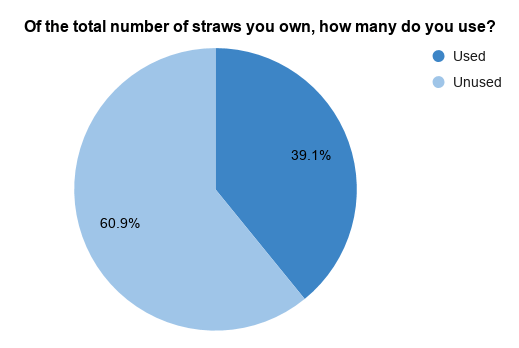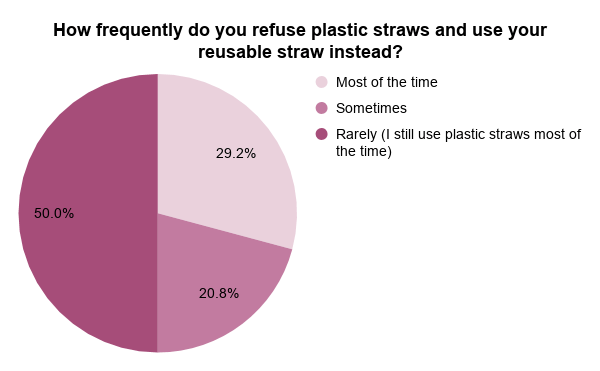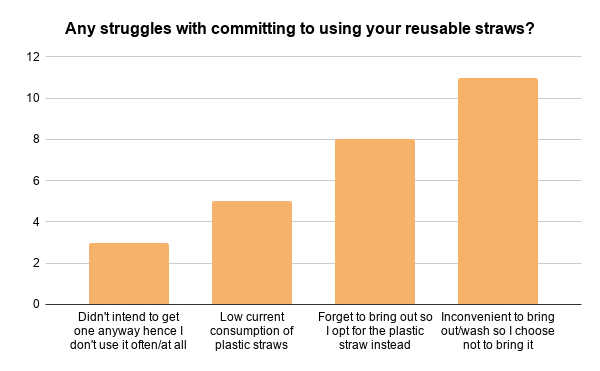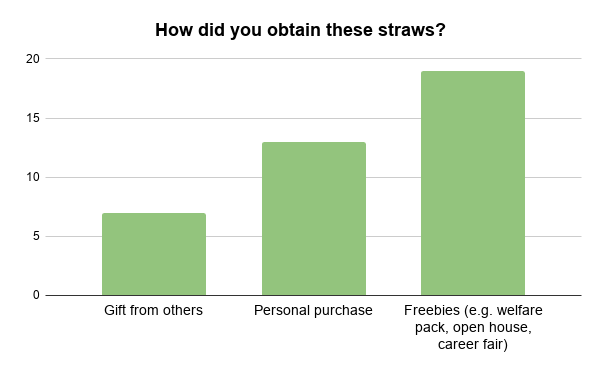Hello!
I’ll be sharing the findings I’ve collated from my recent survey on reusable straws in Singapore. Of the 32 respondents surveyed, 8 did not own any (25%) and the remaining 24 owned at least one reusable straw (75%). Due to the lack of space, I’ll be focusing on the latter instead!
Survey Results
Metal straws were the most popular among the 24 respondents, with everyone owning at least 1 metal straw and only 4 had either glass or bamboo straws as well. When asked which material they preferred, all 4 chose the metal straw, stating reasons like durability, ease of cleaning and size of straws.
On average, each respondent had 2-3 metal straws and I proceeded to ask them how many they owned and how many they used. Tabulating each respondent’s percentage use and taking the average, the chart below was obtained.

As such, we can see that there really is quite a low usage of reusable straws, and this means that quite a lot of them are simply rotting away in our homes (I’m guilty of this too…). Respondents were also asked how often they substituted plastic straws with their own reusable straws, and here’s the result.

We can see here that although respondents owned not 1, but 2-3 reusable straws, half of them still use plastic straws most of the time. 🙁 To better understand the reasons for the low usage of straws, respondents who selected “Sometimes” and “Rarely” were required to respond to the question shown below.

Personally for me, I also struggle with using my metal straws regularly, and it’s definitely not easy to always bring your straw wherever you go! Sometimes, the thought of having to wash the straws would already deter me from buying drinks…
Though, this leads us to think: If they didn’t intend to use their straws all the time, why did they get them in the first place?
Who doesn’t like free things?
Well, that’s not always the case. Here’s a chart showing where respondents obtained their straws from, the majority being from welfare packs, open house gifts and career fair goodies! Could this be a reason why there’s such a low usage of reusable straws, because these straws (sometimes, a set of straws) are shoved into their hands before any thought about committing to one in the first place?

2 straws are enough… right?
Another reason why I struggle with using ALL my metal straws is because I have too many.
Seriously, how many straws does one person need? One thick bubble tea straw for boba cravings, and perhaps one thinner one. Yet, I’ve managed to accumulate 11 metal straws at home, whereby only 3 were personal purchases! I remember desperately wanting to hop on the environmental movement as people switched from plastic straws to reusable ones; looking at others sip their drinks with their straws while using a plastic one was utterly guilt-tripping. As such, the first time I saw an uncle selling metal straws at Frontier 2 years ago, I immediately got one. Fast forward to now, there’s just too many… 🙁
As such, let me leave you with a question.
Should the onus be on the producers to produce less straws, the organisations to stop giving them out, or the consumers (us!) to refuse them?
Stay tuned to next week’s post on what bubble tea shops have done in the name of sustainability and my own sustainability journey! 🙂
Hi Yee Qi!
I too, have multiple metal straws (all were freebies) that I rarely use because I don’t buy drinks outside often. 🙁 I’m wondering how many of your respondents who personally bought reusable straws but rarely use them? If there are such cases, why do you think this happens?
Do you think it would be feasible and effective for bubble tea shops to start charging extra for straws in order to encourage people to use reusable ones?
Thank you, I would love to hear from you soon!
– Si Ying
Hello Si Ying!
Thank you for sharing your thoughts! Among the 24 respondents who had their own reusable straws, 13 of them obtained their straws from personal purchases! If we look at these 13 respondents, 3 substitute plastic straws for their own straws sometimes, 7 do so most of the time and 3 still mostly use plastic straws. When asked for the reasons why they struggle with committing to using their reusable straws, the reasons selected were due to 1. inconvenience (to bring them out and wash), and 2. forget to bring their straws. 🙁
I too have too many metal straws, perhaps we should start a metal straw collection drive where students from NUS with unused metal straws, or used ones that they do not intend to continue using can donate their straws if they’re still in good condition! Though, would people be comfortable using second-hand straws that have been cleaned and sanitised? If they would, these straws could be sold at a cheaper price, catering to those who intend to get reusable straws but aren’t willing to pay so much for them! Perhaps when people see the amount of unused, bought metal straws, they’ll start thinking harder before they purchase one!
As for whether bubble tea shops should start charging extra for straws, this reminds me of the plastic bag charge that has already been implemented in several countries globally. Examples include Malaysia, Hong Kong and Britain, and it has been proven effective by the large reductions in plastic bag use after the implementation of these policies! Even in Singapore, similar initiatives by IKEA and NUS SAVE has seen a reduction in plastic bag usage as well. Yet, I don’t think we can project the effectiveness of a plastic straw charge to parallel that of a plastic bag charge because of several reasons. The plastic bags are used for so many different purposes and given out across a wide range of industries, yet the plastic straw is only applicable largely to the food and beverage industry. Moreover, the plastic bags are used as carriers, meaning that it could be easily substitutable by any other bag (that everyone on this planet should have). Yet, it’s different for the straws because it isn’t really a necessity in our lives and the straw has a very specific purpose, resulting in its only substitute as the reusable straws that aren’t commonplace, unlike the bags. As such, charging a fee for plastic straws would mean customers have to pay money for a reusable one whose functionality remains limited to the consumption of cold drinks.
If bubble tea stores (and other beverage stores) were to implement a plastic straw charge, they would need to provide the reusables straws so it’s accessible and easy for customers to switch over without spending much effort searching high and low on where to get a straw. However, this means the stores would buy them in bulk, and this may also drive up the metal straw production. Moreover, customers who rarely use plastic straws and don’t see a need for the metal straws might end up purchasing one to save money, but these straws would have to be used a long time for them to offset the problems with using a plastic straw. For some, they might not be able to fully comprehend the amount of money they’ve spent on plastic straws, so an idea would be for bubble tea stores to install a screen display showing the total amount of money customers have spent on plastic straws for that day and that month, helping customers better understand their consumption of plastic straws? I think this will be quite feasible and quite cool!
Also, I was thinking if bubble tea stores really implemented these charges, they should implement a standardised fee across all bubble tea shops if not the revenue of the stores which are the first few to implement this charge may be affected, discouraging other bubble tea stores from doing the same. If bubble tea stores don’t disincentivise their customers from using plastic straws, perhaps they could incentivise instead? Some stores like Heytea has adopted the approach of incentivising customers to bring their own tumblers (though I don’t recall this for straws), discounting $0.10 off their drinks, though I’m not sure how effective this has been! 🙂
Hi Yee Qi! Thank you for the interesting read 😮
I also own quite a few metal straws (many of which my family members got for free and dumped them in my room hehe). From your post, I was wondering since a majority of the respondents received their metal straw as freebies, do you know why these events (open houses etc) would always give metals straws out? Is it due to its popularity, affordability or the small and compact size? To add on, are there any other forms of sustainable products that should replace the metal straws in such events that would be of more use to us? Thank you and hope to hear from you soon 🙂
Hello Amira!
Thank you for your question, I’ve been pondering about that as well! Perhaps it’s because reusable straws were gaining traction and were “trendy”, and it could help boost the image of the institution who’s giving it out as well? I do agree that it’s quite attractive as a freebie (at least to me) because the reusable straws are quite unique (different from your usual pens, post-its, files and towels) and aren’t your everyday items! Two sets of free metal straws I’ve received were from two universities in Singapore, and the straws had the school’s name engraved on it, coming in a plastic ziplock and canvas drawstring holder respectively. I think it really becomes a problem when everyone starts giving out metal straws, because how many could an individual use, right?
With regard to what types of sustainable products, I would think that we could seriously do without the freebies because to be very honest, how many of us really use our freebies? Towels, foolscap, pens and files, we would already have our own and sometimes we even think the organisation’s names are printed too largely on the freebies that we don’t use it… I’m guilty of getting freebies for the sake of it, though I scout for freebies that I would use (e.g. laptop case etc) but the problem comes when the freebies aren’t of great quality or you end up getting more than one… But yes! Perhaps we need to even rethink why we need to give out freebies in the first place, could we possibly change the mindset of people to not just go to booths or open houses for the benefits and freebies? OH, not to mention, all the flyers that people throw away afterwards… You’re the expert on sustainable products, what do you think of this suggestion?
Hello Yee Qi!
Thank you for an interesting read about the usage of reusable straws! I am somewhat guilty as well, since I never bring my metal straws out. But to compensate, I either buy drinks home (so I don’t have to use a straw to consume it outside), or I just drink without a straw (applies more to whenever I dine at coffeeshops/hawker centers). However, there are still occasions where I still use plastic straws (e.g. if I’m outside for an extended period of time, or if I forget to ask for no straw when ordering), which does add to the guilt. On another note, regarding the question you posed, I personally think the onus is on us consumers. As consumers, our choices probably have the biggest impact, as producers are usually profit-driven, and if we make a choice, producers will probably be pressured into making changes or risk losses. Of course, this doesn’t mean that producers and other external organizations have zero responsibility.
What are your thoughts on this (assuming you’re not covering this in the next post)? Also, if the freebies included glass and/or bamboo straws instead, do you think it might gain enough traction to replace metal straws too?
Cheers!
Jeng Wei
Hello Jeng Wei!
Thank you for sharing your thoughts on the question posed at the end of my post! I think I definitely agree that the producers should bear the least responsibility since they’re merely catering to demand like you’ve mentioned, and so the onus falls on the consumers of these reusables, which are the organisations and those on the receiving end (us)! I think that between the two, perhaps the organisations would have a greater impact on this.
This is because the organisations could easily switch to finding other ways of publicity, and perhaps it’s time for company collaterals to go because well, who really uses them? Plus, organisations give these collaterals out in thousands, and hence one organisation’s decision to not give out these reusables would translate to thousands less who would be receiving these straws and feeling dumbfounded at what to do with them. Plus, who can resist getting a freebie, right? It’ll take a whole lot of discipline and consciousness to actively refuse these freebies. Even if you as an individual refuses them, they’ll just give it out to the next person in line! Otherwise, they’ll probably keep the extras and distribute them at the next event. Hence, I would think that the organisations would play a bigger role in curbing the phenomenon of unused straws in Singapore.
Though, I feel that switching to glass and/or bamboo straws wouldn’t help solve the problem and instead, merely diversifies the amount of unused straws from a majority of metal straws to glass and/or bamboo ones! Well, I guess these two do have a smaller carbon footprint than metal straws, but glass straws are fragile and bamboo straws taste weird (they really do). Hence, I feel that even more glass and bamboo straws might go unused as compared to metal straws, possibly exacerbating the problem of unused straws? 🙁
What do you think, should we start a movement to ask universities and organisations to stop giving out collaterals and flyers? Even welfare packs contain so many of these types of items! Till our movement succeeds, perhaps we just have to spread the word and be more conscious in actively refusing freebies while curbing that inner kiasu Singaporean spirit!
Hi Yee Qi,
Great post overall !
And great answers to your peers’ comments.
I was surprised by how many ppl cited inconvenience as the disincentive to bringing their metal straws with them. I mean, I totally understand the other reasons, but I think the inconvenience is something that disappears completely very shortly after making something a conscious habit. It becomes almost automatic.
That said… I have an idea. I’d love to know what you think.
You ID a lg number of unused metal straws in ppl’s homes. There’s absolutely nothing less sanitary about using a washed, used metal straw than drinking from a drinking glass in a restaurant, and many restaurants give out reusable straws already.
What if there were to be a nationwide ban on single-use straws, with the govt instead implementing a system of special collection containers all around at the same places where rubbish bins are. When you walk off with your drink, and you’re done with the straw, you toss it in this special container. Then, there are various collectors who pick them all up, return them to several centralised locations where they get sanitised and redistributed to vendors.
jc
Hello Dr Coleman!
Thank you for your comment and for sharing your idea! Regarding the responses on inconvenience, I guess the aspect of having to wash the straw after use (which also implies carrying/storing it until you reach the nearest washing point) also adds to the inconvenience! Building on that, I feel that your idea actually targets both aspects of inconvenience experienced by reusable straw users! This is because for your idea, the washing is now shifted from the consumers to a centralised point, plus the consumers wouldn’t need to buy them or bring them out. Moreover, I feel that this might help save water since the straws will be washed in bulk rather than individually, though there is a technical difficulty in washing the straws since the insides would preferably be scrubbed, hence I’m unsure whether or not the washing process can be automated and if it is, how it’ll be done.
With regard to the feasibility of the idea, it would also be quite labour-intensive since there’ll be the collection and redistribution of straws from many places and this would have to be repeated almost daily to ensure the straws are maintained in good condition. Moreover, the collection containers would likely be enclosed so as to ensure the cleanliness of straws and ensure they do not rust or mould due to the exposure to the sun while keeping insects out. Plus, the fact that different food and beverage outlets would require different amounts of straws also adds another variable into the equation, whereby after reusable straws have been sorted by machines into thick (specifically for bubble tea) and thin ones, they’ll have to be packaged accordingly. However, this raises another issue on the packaging required to ensure good sanitation of the straws, so we’ll have to ensure minimal packaging is used to transport the straws from the collection point to the vendors so as to not offset the benefits produced from the straw ban. Lastly, it would be difficult for the collection and redistribution of straws if they were purchased by the individual food and beverage (F&B) outlets. As such, this would mean that the straws are likely to be purchased, managed and provided by the government, lifting the financial burden from the F&B outlets of buying their own straws and encouraging them to partake in such an initiative! Though, we’ll need to see if the government is willing to pay and maintain the number of usable reusable straws.
Thank you for also pointing out that the metal straws are just like the cups and cutlery used in restaurants and straws, hence we wouldn’t need to worry about whether people would be willing to use reusable straws that have been used by others. This idea would potentially help to alleviate the problem of unused straws in Singapore and completely removes single-use plastic straws from the market (wow!), at the same time monitoring and maintaining the number of reusable straws at a fixed level, which is great! As such, if the details of the actual implementation could be ironed out and potential problems of increased packaging use and carbon emissions from straw-collection vehicles weighed and addressed, this would be a totally feasible and cool idea to implement in Singapore!